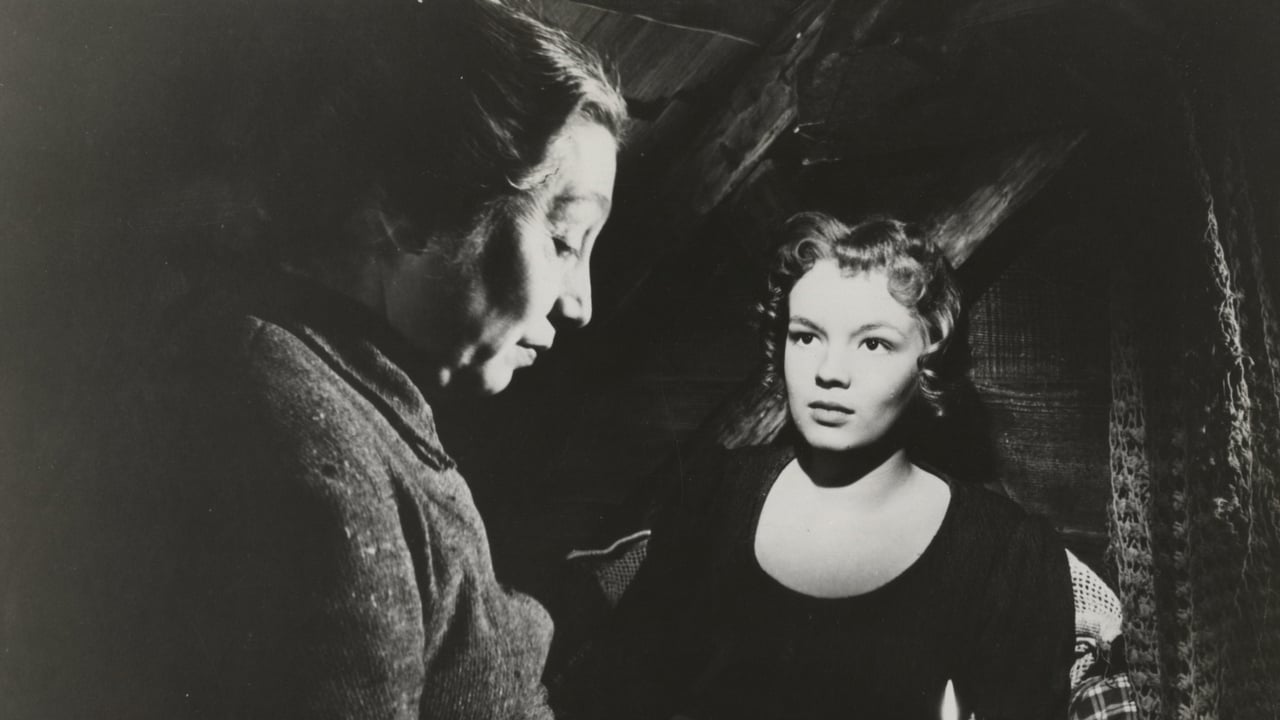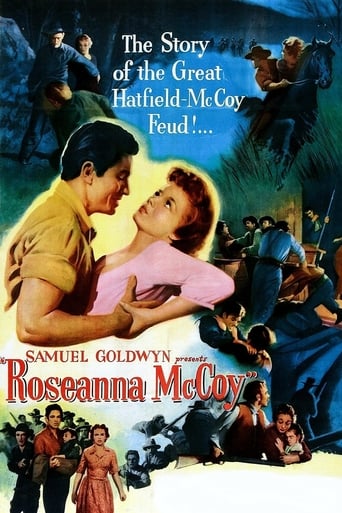GamerTab
That was an excellent one.
Stometer
Save your money for something good and enjoyable
Beystiman
It's fun, it's light, [but] it has a hard time when its tries to get heavy.
CrawlerChunky
In truth, there is barely enough story here to make a film.
mark.waltz
Roseanna McCoy (Joan Evans) has come of age to attract boys, and her over-protective family is determined to make sure she stays virtuous. Papa Raymond Massey and mama Aline MacMahon are God-fearing country folk whose feud with the no-good Hatfields goes back generations. When Roseanna meets Johnse Hatfield (Farley Granger), the son of Pa McCoy's worst enemy (Charles Bickford), he bewitches her like Heathcliff did Cathy in "Wuthering Heights". Sucking out the poison in Roseanna from the sting of a hornet, Johnse finds he can't release her from his soul, and no matter how she fights, he is now in her soul as well. Johnse takes her to meet his parents, and while Bickford isn't at all in favor of a Hatfield/McCoy romance, ma Hope Emerson (the year before she got hisses as the nasty matron in "Caged") is little more receptive, even though she tries to hide it. Johnse is determined to prove to the McCoys that he doesn't have the killer instinct they assume all the Hatfields have, but once one of the nastier Hatfields (played by Richard Basehart) shoots Roseanna's younger brother (Marshall Thompson), the war is back on.This is an attractive film to look at, extremely well acted by a bunch of pros, yet there is little explanation to convince me why these two families hate everybody in the other family with such vengeance. The ending, too (SPOILER ALERT), had me cold, as a sense of good will comes out of nowhere. I don't think in real life, such peace would erupt so quickly out of violence, although there may be some cheering for the way one of the film's villains is dealt with. I longed for a reunion between the matriarch and patriarch of each of the clans, to give further detail to why these families are so reluctant to declare a truce, but they never appear together, except in different shots of the fathers during the final battle.
bkoganbing
Probably Samuel Goldwyns's Roseanna McCoy a story based on the real life Hatfield/McCoy feud would be better known and received today if Paramount had not beaten Goldwyn to the hillbilly saga. Their films, The Trail Of The Lonesome Pine and Shepherd Of The Hills cover the subject far better and are in color.It's Romeo and Juliet once again in a different setting in this film. During a county fair Johnse Hatfield played by Farley Granger meets and flips for young Roseanna McCoy played by newcomer Joan Evans. A hornet stings her and Granger with some first aid with amorous overtones saves her from infection. After that true love will try to win out even over a pair of families who have been feuding for generations.The clan patriarchs are Charles Bickford and Raymond Massey for the Hatfields and McCoys respectively a pair of actors who could convey merciless hate better than most. The women are pretty good to in that department with Aline McMahon for the McCoys and Hope Emerson for the Hatfields. But the guy to watch in this film is Richard Basehart who did a fine line of psychotics in many of his film roles. He just loves being a Hatfield because it gives him an excuse to kill. A McCoy is just someone he's got permission to shoot at will, they're in 365 day hunting season as far as Basehart is concerned.Color would have been nice, but some of the rural area of California substituted nicely for the Appalachins. Roseanna McCoy is not a bad film, but I prefer the ones I cited already from Paramount.
Robert J. Maxwell
In the wilderness of Appalachia of the 1890s, the Hatfield clan and the McCoy clan hate each other. A long-time feud is reignited when young Roseanna McCoy runs off with Johnson Hatfield. A battle ensues.It's Romeo and Juliet in the woods, far more than it's Montagues and Capulets or Hatfields and McCoys. It begins with a cloying love song. Here are some lyrics: "Roseanna, Roseanna, the wind breathes your name." (It's a good thing she wasn't named Betsy.) The focus is on Joan Evans as Roseanna and Farley Granger is Johnse. There is a surprising scene suggestive of rape. Granger has kidnapped Evans and they stand among the pines in the middle of the night. He kisses her forcefully, despite her objections, and pushes her back into a thicket. Dissolve to a glorious sunrise and heavenly music as the two ride a horse in tandem. For all that, Farley Granger is no Sheik of Araby, and Evans is no more than blandly pretty.This is Hollywood's version of the 19th-century backwoods. Appalachia, you will be surprised to know, was actually sunny and pleasant and had many of the kinds of live oaks found in California. Flowers abounded. You can find other examples of this stylized milieu in "Sergeant York" and "Young Mr. Lincoln," two far better films. I wonder if Central Casting didn't send over the same wrinkled, bearded, tobacco-chewing, old men in battered hats.The irony is that this movie pretty much sucks and yet has a fine supporting cast. With Hope Emerson and Aline McMahon as the competing matriarchs, it can't be all bad. And the writers, mostly, I would guess, John Collier, have included a subdued but tense scene between Richard Basehart (his hair shellacked in the traditional 1941 Hollywood fashion) and Joan Evans. The room is dark, the only light is from a flickering fire. She holds an empty pistol on him. He is caressing a knife -- and he's mad.The tale itself -- the senseless, murderous feud between two extended families in a classic Appalachian backwoods culture -- has a great deal of promise. The place names alone evoke the proper atmosphere -- Pike County, The Big Sandy, Kentucky, Pikeville, The Tug Fork. Those names are hardly ever used in the film. Maybe that's one of the reasons this all adds up to one of the dullest movies ever made.
dollpenguin
I really expected to like Roseanna McCoy because it had a really good premise and fine actors. Unfortunately, the way the characters were developed left much to be desired. Johnse Hatfield is introduced as a stalker, which may have been acceptable in 1949. However, I have watched many movies from that era and the way Johnse behaved (supposedly)out of desire for her would never have been acceptable.Johnse's actions concerning Roseanna McCoy may have been begrudgingly tolerated after a long courtship. But from his first several meetings with her, it is made clear that Johnse is a loathsome and dumb, albeit handsome, brute. I understood Roseanna McCoy was supposed to be extremely naive, but some of the ridiculous choices she made left me wanting to see bad things happen to her. It did not seem like Roseanna cared about anything or anyone, including herself.The lovers' families were feuding just like in Romeo and Juliet, but that is where the similarities end. Johnse was certainly no Romeo and Roseanna was definitely not Juliette. The love story seemed very forced, and not just because Johnse takes what he wants, world be damned. In the third act, the movie tries to create sympathy for the two characters but it is far too late. Johnse and Roseanna were the two characters I cared about least in the movie.As other reviewers have stated, the cinematography was excellent in Roseanna McCoy. I just wish the rest of the film had been as fine as the camera-work.

